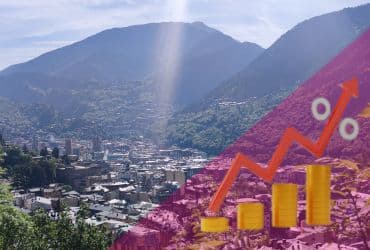The Government of Andorra has outlined a new legislative proposal aimed at achieving moderate and sustainable population growth. This bill builds upon the Law on Sustainable Growth and the Right to Housing, approved on 16th April, 2025.
The new text proposes significant changes to legislation governing immigration and foreign investment, particularly the requirements for obtaining passive residence permits, residence permits for self-employment and certain other permits.
The bill’s main objectives are to strengthen control of immigration and to increase the financial requirements for the aforementioned types of residence, thereby ensuring a balanced development of the country.
Table of contents:
- Stricter requirements for obtaining a passive residence permit in Andorra
An increase in tax on foreign investment in property
New criteria for self-employed workers
New measures to control immigration and recruit at source
The origin of the tax on foreign investment in property
The tax on foreign investment in property reached 80% of the annual target in only six months
The law on sustainable growth and the right to housing
A new scenario for investors and residents
Stricter requirements for obtaining a passive residence permit in Andorra
The new legislative project proposes an increase in the financial requirements for obtaining a passive residence permit.
The main changes include:
- An increase in the minimum mandatory investment, which will increase from €600,000 to €800,000, following the upward trend of recent years (it was €400,000 in 2022).
- A non-refundable contribution of €30,000, plus a payment of €6,000 for each of the applicant’s dependants.
These measures are intended to strengthen the sustainability of the migration model. The government also aims to attract individuals with greater financial capacity and increase fiscal revenue, in line with its strategy of moderate and responsible growth.
An increase in tax on foreign investment in property
Significant changes in the tax on foreign investment in property are under consideration. The aim is to reduce pressure on the housing market and strengthen the sustainability of urban growth. The new fiscal conditions under consideration are:
- For the first property purchased, a rate of 6% would be applied.
- From the second property onwards, the fiscal burden would increase to 10%.
This means that the tax rate would double for each property (the tax rate was previously 3% for the first property, 5% for the second property and 10% for the tenth property onwards).
This change is intended to moderate demand for property from foreigners while significantly increasing the country’s revenue.
New criteria for self-employed workers
The bill also introduces new requirements for self-employed residence and stricter control of access to the labour market:
- The quota reserve requirement for self-employed workers (prior to the granting of authorisation) would be extended to include qualified professional workers.
- Non-EU workers would wait until their third renewal before changing professional sectors, i.e. until after five years of residence.
- As with passive residence permits, a non-refundable contribution of €30,000 would also be required for this type of permit.
These proposals are intended to ensure that applicants’ professional and financial profiles are aligned with the country’s needs, and are intended to contribute to greater stability in the labour market.
New measures to control immigration and recruit at source
The draft bill proposes a new type of authorisation that would enable the government to exercise greater control over the recruitment of temporary workers. If approved, it could come into force during the 2026–27 season. The bill also proposes to create mechanisms to control the amount of overtime worked by those holding temporary residence permits, with a maximum of 52 hours per week in the same sector, or a maximum of 12 hours per week in each of several different sectors.
The origin of the tax on foreign investment in property
Prior to the introduction of this tax, the Andorran Government had already taken steps to regulate foreign investment in property, and to mitigate its impact on the accessibility of housing for the local population.
In September 2023, the Executive announced a temporary suspension of new foreign investment in property in order to contain the sustained increase in acquisitions and ensure a more balanced type of urban development. This moratorium remained in place until October, when the new tax was officially introduced.
This process resulted in the coming into force of Law 3/2024 on 29th February, 2024. This law regulates tax on foreign investment in property, and includes the relevant regulations.
Read the full article on the law affecting the tax on foreign investment in property.
The tax on foreign investment in property reached 80% of the annual target in only six months
By 30th June, 2025, the cumulative revenue had reached €7.39 million, representing 80% of the government’s forecast for the whole financial year (€9.35 million).
During the first year of its implementation (2024), this tax generated total revenue of €15.58 million, which also exceeded initial expectations.
With the planned increase in the fiscal burden for 2026, the Government of Andorra would collect revenue amounting to €22.2 million.
The law on sustainable growth and the right to housing
The bill recently presented by the Andorran Government builds upon and extends the Law on Sustainable Growth and the Right to Housing, which was approved in April, 2025. This legislation aims to strike a balance between economic growth and social and territorial sustainability.
Among the main measures that it envisages are:
- Regulation of the use of tourist flats to control their proliferation.
- Incentives to make empty flats available for the residential rental market.
- Changes to taxation on housing and foreign investment, and changes to immigration, with the aim of ensuring more equitable development.
This law emerged from the debate on housing that was held in the Andorran Parliament in November, 2024. It provides the foundation for new legislative proposals that seek to establish a model of a more sustainable and accessible country. Read the full article to find out more about its content and its potential impact on your situation or investment strategy.
Law on Sustainable Growth and Right to Housing in Andorra
A new scenario for investors and residents
The new bill presented by the Andorran Government marks a turning point in the country’s growth model. The tightening of the financial requirements for residence and the introduction of stricter fiscal measures demonstrate a clear commitment to sustainability, territorial balance and control of immigration.
Although the conditions for residing or investing in Andorra would be more demanding, these measures would also help to reinforce the Principality’s legal and economic framework.
Our team closely monitors all legislative developments to provide our clients with clear, up-to-date information.
Have you any questions about the way these changes would affect you? Contact us for personalised advice.



